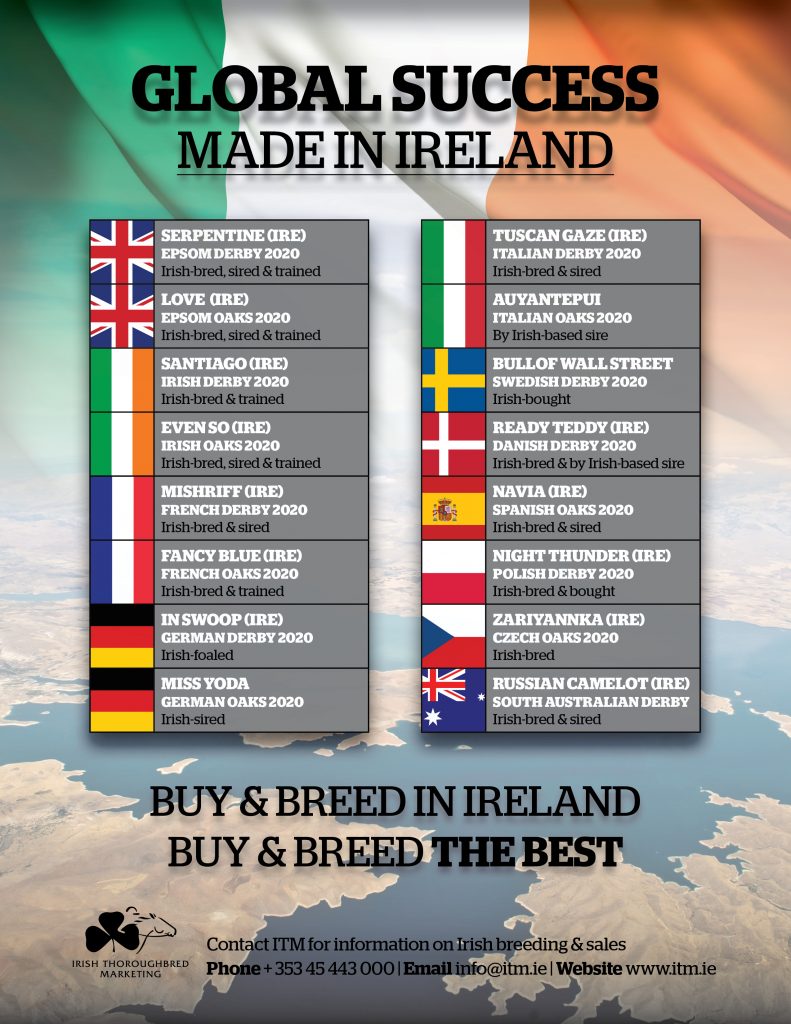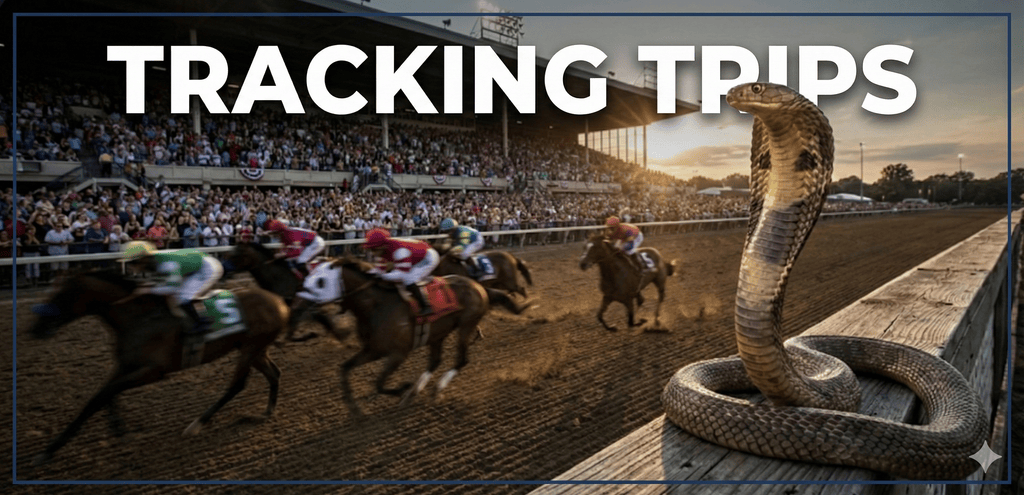
2020 has been an unusual year. It has changed our lives and the way we live – not necessarily for the better. It has seen races that are institutions in our sport altered, the most recent ‘victim’ of this being the Kentucky Derby, run in September at Churchill Downs – yes in September, not in its usual timeslot of May. Thousands of race fans were denied the opportunity to witness the incredible triumph of Authentic over the Belmont Stakes winner, Tiz The Law. All of these changes are as a result of the circumstances we currently find ourselves in, in the midst of a global pandemic.
On the other side of the Atlantic Ocean, European thoroughbred racing has found itself in similar circumstances. Patrons could not attend legendary European Group 1 races such as the Dubai Duty Free Irish Derby at The Curragh, the Investec Derby at Epsom, England, or the Prix du Jockey Club (French Derby) at Chantilly. The Investec Derby at Epsom was run in July instead of its traditional time in early June.
Despite the difficult and trying circumstances, racing authorities in Europe succeeded in running most of their major races. Though owners, trainers, jockeys, fans and everyone else connected with horse racing have been greatly inconvenienced by current situation, one thing has remained contestant in Europe’s major race in 2020 – the success of the Irish-bred thoroughbred racehorse in winning Group prizes throughout the Continent.
The Irish, English and French Derbies are the three most valued and most important in Europe. Santiago won the Dubai Duty Free Irish Derby in June – the three-year-old son of Authorized was bred by Lynch Bages Limited, the breeding establishment of former Irish National Hunt jockey Timmy Hyde and his family. In fact, the first five horses to pass the wire in the Group 1 contest in Co. Kildare were all bred in Ireland: Santiago, Tiger Moth, Dawn Patrol, Order Of Australia and Fiscal Rules. The winner, Santiago, similar to the first four horses home in the Premier Irish Classic were all trained in Ireland by multiple-time Champion trainer Aidan O’Brien, who was also the successful handler of the Investec Derby victor in July, Serpentine. The Emmet McNamara-ridden winner was both owned and bred by Coolmore. The runner-up Khalifa Sat was bred by Declan Phelan and the Irish National Stud, while the third-placed colt, Amhrán Na Bhfiann was bred by Lodge Park Stud in County Kilkenny.
Due to the extraordinary situation British Horseracing found itself in, the authorities there took the unprecedented step of also running the Investec Oaks on the same day as the Investec Derby, something that had never happened in the 200-plus years of both Classics. The winner and runner-up in the Fillies’ Classic were bred, trained and sired in Ireland. The Coolmore-owned and bred daughter of super sire Galileo was the victor, ahead of stable companion, Ennistymon, owned and bred by Mrs Evie Stockwell, mother of Coolmore Stud magnate, John Magnier. Aidan O’Brien was again the successful handler of the 1-2 in the Group 1.
In the Juddmonte Irish Oaks places 1-5 were taken by Irish-bred fillies. The winner, Even So, by Camelot, was bred by Lynch Bages Limited, the successful breeder of Santiago in the Dubai Duty Free Irish Derby. Even So, owned by the Coolmore partners, was a second Classic of the season for Irish trainer Ger Lyons, who only won his first Irish Classic with the Prince Khalid Abdullah (Juddmonte Farms)-owned colt Seskin in May. Cayenne Pepper – bred in Ireland by G H S Bloodstock and J C Bloodstock – was second in the Irish Oaks for top female handler Jessica Harrington, a former three-day evening rider who represented Ireland at European, World and Olympic Games. Passion, the third-placed daughter of Galileo, was also bred by the aforementioned Lynch Bages Limited and Camas Park Stud. Laburnum and Snow, who finished fourth and fifth respectively, and are both daughters of Galileo, were bred by Swettenham Stud and Barronstown Stud respectively. The domination of the Coolmore partners ownerships was very evident in the contest with all except the runner-up, Cayenne Pepper, in the John Magnier, Michael Tabor and Derrick Smith ownership.
In France, both the Group 1 Prix du Jockey Club (French Derby) and the Prix de Diane (French Oaks) saw Irish-bred horses triumph. Mishriff, trained in Britain by top trainer John Gosden, claimed the Derby, and was bred in Ireland by Nawara Stud Limited, the breeding operation of the son of Make Believe’s owner Prince A A Faisal. Tipperary, Ireland-based Coolmore Stud bred and owned Fancy Blue, the French Oaks winner, who gave her young trainer and former Irish champion flat jockey Donnacha O’Brien – son of Irish champion trainer Aidan – his first Classic success.
Elsewhere across Europe, Irish-bred horses have been to the fore in the top races. In Swoop (breeder: Stall Ullman) took the German Derby, while the Irish sired Miss Yoda (by former Irish-bred and trained Prix de l’Arc de Triomphe victor, Sea The Stars) was the winner of the German Oaks. The Italian Classics also fell to horses bred in the Emerald Isle as Tuscan Daze (bred by Corduff Stud, County Kildare) and Auyantepui (by Irish-based sire Night Of Thunder) won that country’s Derby and Oaks respectively. In Poland, Night Thunder (by Night Of Thunder from Kildangan Stud, County Kildare) won the Derby while Inter Royal Lady (a daughter of Holy Roman Emperor bred by Fergus Cousins) took the Oaks. The Spanish Oaks was won by Navia (the Richard Ahern-bred daughter of Ballylinch Stud, Co. Kilkenny-based stallion, Lope De Vega), with the Czech Oaks going the way of Zariyannka (bred by the Aga Khan Studs in Ireland). Ready Teddy (by Fayruz, who stands at Tally Ho Stud, in Mullingar, County Westmeath) was first in the Danish Derby, while the Irish bought Bullet Of Wall Street tasted success in the Swedish Derby. Further afield, in Australia, Russian Camelot, bred by the successful Lynch Bages and Camas Park Stud in Cashel, County Tipperary, and ridden by Irish-born jockey Johnny Allen, won the South Australian Derby at Morphettville.
Where I started by stating that some many things have changed in horse racing this year, one things has remained constant despite everything – Irish-bred thoroughbred horses are still achieving at the highest level, in Europe and elsewhere. The results are there to prove it.




